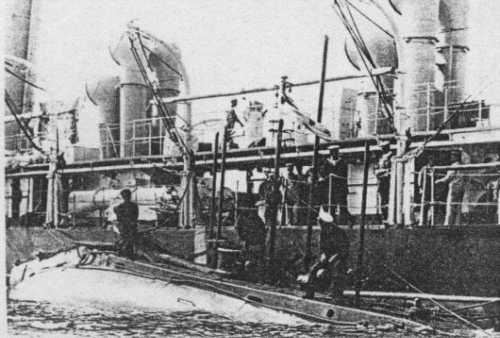
NAVYPEDIA
 Support the project with paypal
Support the project with paypal
Photo

'Holland' submarine alongside depot ship Hazard
Ships
| Name | No | Yard No | Builder | Laid down | Launched | Comp | Fate |
|---|---|---|---|---|---|---|---|
| No 1 | Vickers, Barrow | 2.1901 | 2.10.1901 | 2.1903 | sold 10.1913 | ||
| No 2 | Vickers, Barrow | 2.1901 | 21.2.1902 | 8.1902 | sold 10.1913 | ||
| No 3 | Vickers, Barrow | 2.1901 | 9.5.1902 | 8.1902 | sold 10.1913 | ||
| No 4 | Vickers, Barrow | 1902 | 23.5.1902 | 8.1903 | sold 8.1912 | ||
| No 5 | Vickers, Barrow | 1902 | 10.6.1902 | 1.1903 | sold 8.1912 |
Technical data
| Displacement standard, t | |
|---|---|
| Displacement normal, t | 110 / 122 |
| Length, m | 19.5 |
| Breadth, m | 3.58 |
| Draught, m | 3.02 |
| No of shafts | 1 |
| Machinery | 1 petrol engine / 1 electric motor |
| Power, h. p. | 160 / 74 |
| Max speed, kts | 8 / 7 |
| Fuel, t | petrol 2.2 |
| Endurance, nm(kts) | 250(8) / 20(7) |
| Armament | 1 - 356 TT (3) |
| Complement | 8 |
| Diving depth operational, m | 15? |
Standard scale images

No 1 1903
Graphics
Project history
Although the First Sea Lord professed publicly that he saw no reason for the Royal Navy to have submarines the growing numbers of submarines in France and the United States caused unease. Thus when in the summer of 1900 the Electric Boat Co offered to build Holland-type submarines, negotiations quickly got under way. By November 1900 an outline agreement to build five boats under licence at Barrow had been concluded and the Treasury was asked to provide secret funding. A brief statement in the 1901-1902 Estimates announced the plans to build, and a firm order was given to Vickers in December 1900, followed by the keel-laying of No1 the following February.
In fact No 2 entered service first, as No 1 was conducting exhaustive first-of-class trials. All five were in service by 1903, giving the Royal Navy vital experience for the design of its own boats. They were extremely primitive and could never be more than experimental craft, and yet they served for ten years without suffering any serious accidents. No 1 was laid down in February 1901 and ran trials in February-April 1902, although accepted she did not become operational for another year.
Modernizations
None.
Naval service
No 1 was used for training and based at Fort Blockhouse until sold in 1913. She foundered in tow from Portsmouth and was rediscovered in April 1981. She has been raised in 1982 and is now being restored at the Submarine Museum at Gosport. No 4 was stricken in 1912 and foundered in tow 3.9.1912, but was raised and later sunk as a gunnery target in 1914. No 5 arrived at Portsmouth late in 1902 and served with the first flotilla until removed from the Effective List in August 1912. She foundered in tow to be BU 8.8.1912.
 HOME
HOME FIGHTING SHIPS OF THE WORLD
FIGHTING SHIPS OF THE WORLD UNITED KINGDOM
UNITED KINGDOM SUBMARINES
SUBMARINES "Holland" submarines (No1) (5, 1902 - 1903)
"Holland" submarines (No1) (5, 1902 - 1903)
